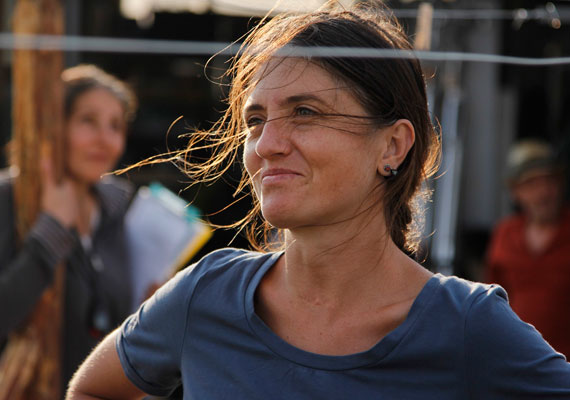Svetla Tsotsorkova • Director
“The audience has lost their trust in the films we make here”
- Already selected at several film festivals ahead of its world premiere at San Sebastián, Bulgarian filmmaker Svetla Tsotsorkova’s Thirst is being released domestically on 22 April

A convincing first feature, Svetla Tsotsorkova’s Thirst [+see also:
film review
trailer
interview: Svetla Tsotsorkova
film profile] amazes with the compelling way in which it uses a remote place in rural Bulgaria in order to tell a story about old and new. The director reveals the production challenges in an interview conducted ahead of the film’s domestic release.
Cineuropa: The location was very effective for the story. Was the screenplay written with that place in mind?
Svetla Tsotsorkova: We spent a few months looking for a place to shoot the film. When we found the perfect village for the script, we started to wonder why no summerhouses were built there, since the view was so beautiful. We quickly realised it was because the area doesn’t have a proper water supply. The few people who do live there still have to get their water from a spring. Drought cannot give birth to anything, but it makes you very resourceful. We saw that in one of the houses, where someone had built a pool to gather the water when it rained. We immediately decided to use that detail in the film. My teacher Georgi Djulgerov used to say to me when I was his student at the Film Academy in Sofia: “Life is the greatest inventor.” He was right.
You seem to be very effective at working with young actors. Do the teenage years have a special significance for you as an auteur?
I spent my childhood in a little village in one of the mountains in Bulgaria. I was certain that life in the village was boring and monotonous. Now, when I think about it, I feel I was as thoughtless and careless as childhood is. Now I have gone back to those years for the second time, looking for a theme for a film – maybe because I know that there is no other way to go back there.
What was the most challenging aspect of shooting Thirst?
Finding teenagers who could play the roles of the boy and the girl was a challenge. It took me almost two years. My assistant and I spent many hours watching boys and girls play in the park or in schoolyards. If we thought any of them looked interesting, we approached them. I could just imagine how we looked in their eyes. I saw over 3,000 teenagers before I found Monika and Alexander.
Working with clever, sensitive and professional actors like Ivaylo Hristov, Svetlana Yancheva and Vasil Mihajlov was very useful, but it was also a challenge. It was my first film, but their one-hundredth. Their experience on screen helped a lot when developing the characters, but sometimes it was a struggle to get what I wanted from them.
How challenging is releasing a Bulgarian film in Bulgaria? What can you do in order to make sure a film is both a festival and an audience success?
You have to listen to yourself. You have to trust your sensibility, taste and mind. Tell stories that you know or have experienced. Talk about characters that you have met or you truly understand. Then I believe a positive result will come, one way or another.
Calculating whether the film will be an audience success or trying to please festivals is a different matter entirely. One of the problems with film distribution in Bulgaria is the lack of a stable arthouse cinema network. The multiplexes show mainly American films; they don’t have any interest in showing Bulgarian or European cinema. This turns film distribution into the work of an apostle: often, the filmmakers grab their movie and travel from one city to another, negotiating with the local authorities as to whether they can show it to the local audience. That is how they struggle for the attention of every cinemagoer.
Our film is about to be released in Bulgaria. The audience has lost their trust in the films we make here. We need to dig a tunnel, but we need to dig it from both sides: that of the authors and that of the cinemagoers. Hopefully we’ll meet somewhere in between.
Bulgaria has been offering a very impressive crop of first features lately, suggesting an interesting change of generations. How would you describe the Bulgarian cinema landscape from your perspective?
Bulgarian cinema is heavily dependent on financial support from the state. If the government decides that the budget is threatened, the first cut will be to the cultural budget. This led to years during which we produced no movies at all. I sincerely hope that the government has realised that culture is one of the few distinguishable products of our country. I also hope that they have understood that culture cannot be “guided”; rather, it should be supported. There are a lot of talented filmmakers in Bulgaria from all generations. They just need to be able to work without any interference from the government.
Did you enjoy reading this article? Please subscribe to our newsletter to receive more stories like this directly in your inbox.
















